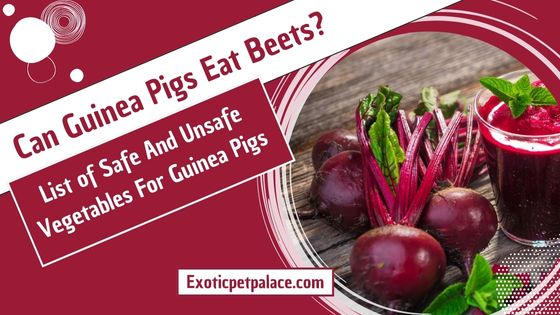Beets, commonly called beetroot, are a colorful root vegetable with a sweet and earthy flavor. They are rich in nutrients and provide several health advantages to people.
Can Guinea Pigs Eat Beets? The answer is yes, but there are several key factors to consider.
This article digs further into beets and guinea pigs, including nutritional composition, potential advantages and risks, serving quantities, and frequently asked questions.
Let’s start.
Also Read:
Can Guinea Pigs Eat Hamster Food?
Nutrition Fact: Can Guinea Pigs Eat Beets?
Guinea pigs can indeed enjoy beets, but like most foods, they should be fed in moderation.
Beetroot offers a range of essential nutrients for guinea pigs, making it a valuable occasional addition to their diet.
Here’s a breakdown of key nutrients per 100 grams of beetroot:
Vitamin C: 6.8 mg. It is essential for immune system function and collagen formation.
Fiber: 2.8 g (improves digestion and intestinal health).
Potassium: 390 mg (helps maintain healthy muscles and neurological function)exclamation
Folate (vitamin B9): 189 micrograms (essential for cell development and DNA synthesis).
Manganese: 0.3 mg (required for enzyme action and metabolism).
Calcium: 80 mg (essential for bone health, but requires moderation in guinea pigs).
Sugar: 6.8 g (mainly natural sugars, but still requires supervision.)
While beetroot offers a good source of vitamins and minerals, it’s crucial to remember that guinea pigs primarily rely on hay for essential nutrients like fiber and vitamin A.
Are Beetroot Good for Guinea Pigs?
Beetroot can be a healthy addition to a guinea pig’s diet in moderation due to the following benefits:
🐾Beets include vital vitamins and minerals required for normal bodily function and illness prevention.
🐾Folate is essential for red blood cell production, particularly during pregnancy and infancy.
🐾Potassium reduces blood pressure and maintains bone density.
🐾Beets also contain antioxidants known as betalains.
Remember, variety is essential in a guinea pig’s diet. So, feel free to include beets as part of their balanced nutrition!
Is Beetroot Poisonous to Guinea Pigs?
Beetroot is not poisonous to guinea pigs, but there are some potential risks to consider when introducing it to their diet:
High Calcium Content:
Beetroot contains a moderate amount of calcium. While calcium is essential for bone health, excessive amounts can contribute to bladder stones in guinea pigs.
Sugar Content:
Although the sugar in beetroot is mainly natural, too much sugar can lead to weight gain and dental problems.
Digestive Discomfort:
Introducing new meals, even nutritious ones, can create digestive issues in guinea pigs. Begin with a small dosage and check their tolerance.
Note: If you notice any signs of digestive issues like diarrhea or bloating after feeding beetroot, discontinue it immediately and consult your veterinarian.
Can Guinea Pigs Eat Beet Greens, Leaves, Tops, and Stems?
Beet greens, leaves, tops and stems all refer to the leafy portion of the beetroot plant.
While the beetroot itself can be a healthy occasional treat for guinea pigs in moderation, the answer to whether they can eat the leafy parts is a resounding no.
Here is a summary of the reasons why.
Oxalic Acid:
The biggest worry with beetroot greens, leaves, tops, and stems is the high oxalic acid level.
In guinea pigs, this naturally occurring chemical can bind to calcium, potentially causing bladder stones to develop.
While modest quantities are normally tolerated, frequent intake may offer health hazards.
Calcium Content:
Beetroot greens provide a moderate quantity of calcium.
While calcium is necessary for bone health, excess can lead to bladder stone development in guinea pigs.
Beetroot greens impose an unneeded calcium load because they acquire the majority of their calcium from hay and pellets.
Digestive Issues:
Guinea pigs’ sensitive digestive systems may struggle to manage the extra fiber and oxalic acid in beetroot greens.
Introducing a new food containing these ingredients may cause digestive distress, such as bloating, diarrhea, or gas.
Best Alternatives for guinea pigs:
Guinea pigs can eat a variety of safe and healthy vegetables instead of beetroot greens.
Instead, consider providing carrots, green beans, romaine lettuce, or bell peppers.
These include critical vitamins and minerals without the hazards associated with beetroot greens.
Tips For Feeding Beet to a Guinea Pig
Beetroot can be a fun and healthy addition to your guinea pig’s diet, but the presentation can play a big role in how readily they accept this new food.
Here are some tips and tricks to entice your furry friend to explore the world of beets:
Preparation:
Here are a few steps of preparation:
Size Matters:
Begin with a small quantity for the initial serving, such as a pea-sized cube. You can progressively raise it to a maximum of 1/4-inch cube, but remember that moderation is essential.
Wash Properly:
Before serving the beetroot, wash and dry it completely. Any leftover dirt or dampness may deter your guinea pig.
Greens Out:
Remove the beetroot greens since they contain oxalic acid, which can be toxic in large quantities. Stick with the root vegetable itself.
Raw or cooked?
Both options work! You may serve beetroot raw, steamed, or roasted. Experiment to see what your guinea pig prefers.
Notice: Processed beets with added sugars or salt should be avoided as it is unhealthy.
Engaging Presentation:
After you have prepared food, it’s time to present it charmingly.
Here are a few tips:
Hide and Seek:
Dice a tiny beetroot cube and hide it within their hay pile. This encourages natural foraging behavior and adds an element of fun as they search for their new treat.
Skewer Surprise:
Thread a small beetroot cube onto a skewer with other safe vegetables like bell peppers, cucumbers, or cherry tomatoes.
This creates a visually appealing and stimulating snack that caters to their natural nibbling instincts.
You can even get creative with different skewer shapes for added enrichment.
Stuffed Veggie:
Hollow out a small cherry tomato and fill it with a minuscule amount of grated beetroot for a delightful and healthy surprise.
This creates a visually interesting option and can be a fun way to introduce beetroot to guinea pigs who might be hesitant at first.
Location, Location, Location:
Place the beetroot in a clean food dish or scatter it around their enclosure.
This allows them to choose how and when they want to explore this new food.
Variety is Key:
Even if your guinea pig loves beetroot, don’t make it a staple food.
Rotate it with other safe vegetables like bell peppers, green beans, and romaine lettuce to ensure a well-rounded and balanced diet.
Remember that each guinea pig has individual preferences.
Some enjoy eating beetroot, while others may need more coaxing.
Be patient, monitor their behavior, and adjust your serving ways to their specific demands.
With these ideas and creativity, you can make beets a fun and fulfilling component of your guinea pig’s diet.
Safe And Unsafe Vegetables For Guinea Pigs
Here is a list of vegetables that are safe and unsafe for guinea pigs:
Safe Vegetables for Guinea Pigs:
Vegetables are a great source of vitamins, minerals, and fiber for your guinea pig.
They should make up the majority of their daily fresh vegetable intake (around 1/2 to 1 cup per day, per guinea pig).
Here is a list of vegetables which are safe for guinea pigs:
- Leafy greens:
Romaine lettuce, red and green leaf lettuce, dandelion greens (wash thoroughly as they can harbor parasites), chicory, endive, escarole, bok choy, parsley (limit due to high calcium content), cilantro (limit due to high calcium content).
- Bell peppers:
Red, orange, or yellow. Limit green peppers as they are less nutritious.
- Herbs:
Basil, mint, oregano, thyme (in very small quantities).
- Cruciferous vegetables:
Broccoli florets (in moderation as they can cause gas), Brussels sprouts (in moderation as they can cause gas), and cabbage (in moderation as they can cause gas).
- Other:
Celery, green beans, snap peas, cucumber (in moderation as it can cause diarrhea), squash, zucchini, and radish tops (in moderation).
Unsafe Vegetables for Guinea Pigs
These vegetables can cause health problems for guinea pigs, so avoid giving them to your pet.
- Avoid altogether:
Avocados, chives, garlic, leeks, onions, rhubarb (leaves and stalks), potatoes (all parts), tomatoes (leaves and stems).
- Limit intake:
Arugula, beetroot (greens), spinach (due to high calcium content), Swiss chard (due to high calcium content).
Remember, If you notice any signs of digestive upset after introducing a new vegetable, such as diarrhea or bloating, stop feeding it to your guinea pig.
Consult with your veterinarian if you have any questions about what vegetables are safe for your guinea pig.
FAQs
No, beet greens are high in oxalic acid, which can be harmful to guinea pigs in large quantities.
Yes, the pigments in beetroot can cause a harmless pink tinge in your guinea pig’s urine.
Here are some alternatives of beetroot:
Bell peppers
green beans
romaine lettuce
carrots
While guinea pigs can have cooked beets in moderation, avoid beet chips.
Cooked beets are best offered plain, with no added sugars or salt.
Beet chips are often processed and can be high in unhealthy fats and salt, not suitable for their sensitive digestive systems.
No, guinea pigs cannot have pickled beets or canned beets.
These options are typically high in sugar, salt, and preservatives, which are not good for their sensitive digestive systems.
Stick to fresh, raw beetroot offered in moderation.
While beet itself is okay in moderation, avoid beet juice and powder for guinea pigs.
These concentrated forms are higher in sugar and may contain additives that aren’t good for their sensitive digestive systems.
Stick to offering small pieces of fresh beetroot for an occasional treat.
Conclusion
Beetroot can be a fun occasional treat for your guinea pig, as it provide vitamins and variety.
Remember moderation!
This root vegetable has some calcium and sugar, so start small and monitor their tummy.
Serve raw, steamed, or roasted beetroot in fun ways to keep your cavy entertained.
Explore the provided safe and unsafe veggie list to create a well-rounded diet for your furry friend!
Take care of you guinea pig!💖💖
Please Pin it and share with other guinea pig owners.


